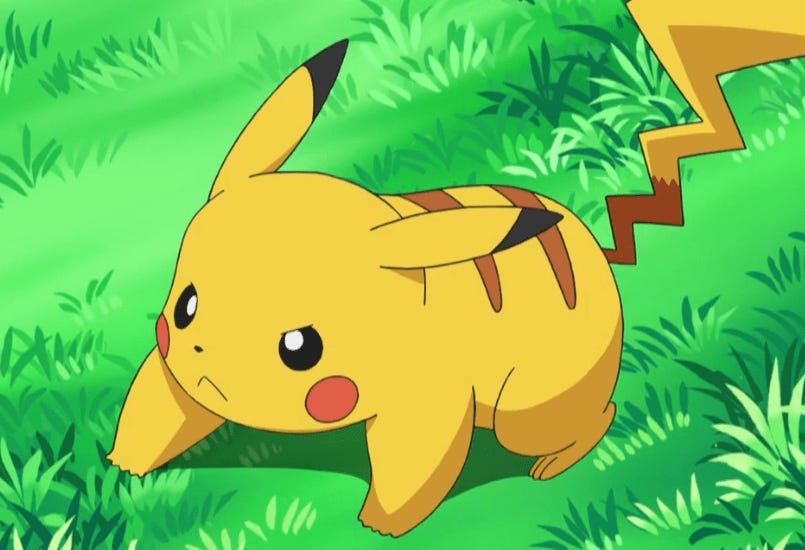The (spurious) Nutrient Sensing Argument
"I sense a soul in search of answers"
Brief Update - down 80lbs!
Before I begin: as you might know, I’m currently doing a repeat of last month’s ex150nosauce+ACV experiment.
It’s going phenomenally well. I’m on day 20 out of 30, and I’m down another 6lbs or so, which puts me at 80lbs lost total since beginning ex150.
Of course this also means I immediately smashed through my old plateau low of 217lbs and have been sitting around 211-212lbs for the last week.
With a little luck, I might break through the 210lbs mark before the end of the experiment.
Fun times!
Now back to our regularly scheduled programming.
What is Nutrient Sensing?
This isn’t the official name, I think, but I don’t know a better one.
The idea is that your body is “very smart” and will intuitively sense when it’s missing nutrients. It then proceeds to induce a craving for foods containing this exact nutrient.
In short, you should eat what your body tells you to.
Unfortunately, I think this is mostly unhelpful for several reasons:
Plenty of people have completely ruined appetite/craving systems, as there are various pathways that can be broken. These people sense that they should eat more fried chicken.
Our appetites and cravings are pretty vague. Most people can’t tell them apart well, and we don’t have good language to describe them. It’s therefore both difficult to read for the individual, and also difficult to communicate, which desires are caused by a lacking nutrient, and which ones aren’t.
There appear to be plenty of nutrients that we can lack and never get any cravings for, silently dying on the inside without a clue. Or at least, without a clue until major symptoms appear. For example, I am not aware that animals or people deprived of certain vitamins (A, B, C, D, K) develop cravings for foods containing them.
The people arguing in this fashion tend to make up just-so stories and only argue for their favorite things. If someone’s arguing that your appetite for candy means you’re sugar-deprived (Peaters) or protein making you ravenous means you’re protein-deprived (gym bros), he’s unlikely to turn around and accept the idea that obese people are lacking in whatever’s uniquely found in KFC.
That said, there seems to be some evidence that we can sense SOME nutrients, for example sodium, and our appetite for it increases when we lack it. But that system is more complex than it sounds.
In addition, I’ve experienced various “something is wrong” symptoms on extreme diets, but my cravings or appetites didn’t necessarily point me in the right direction.
For example, when I eat less than ~40-45g of protein per day over several days, I start to get issues - but I don’t necessarily get cravings for steak or chicken breast or protein powder.
My body seems to know “something is wrong” but not how to fix it.
Plenty of known breakages in our appetite system
First, let’s just observe that CLEARLY many modern people have broken appetite systems in many ways.
If someone is morbidly obese, it’s likely that he is actually more hungry than his lean equivalent would be. You could argue that he only got to be morbidly obese because something, anything, was wrong with his appetite regulation system.
In a metabolically healthy person, appetite should diminish rapidly once enough food has been consumed. If he somehow got fat, his appetite should be decreased until he used up those extra fat reserves, at which point it should return to previous levels.
This was observed in early studied on overfeeding: it was extremely difficult to fatten up prisoners, and they had to stuff themselves with 5,000-10,000kcal/day, which was a painful chore.
Once the prisoners were allowed to eat normally again, they rapidly lost all the weight until they had returned to their pre-overfeeding weight.
The mere presence of obesity thus tells us that our appetite regulation system cannot be trusted fully.
Endocannabinoid System
One concrete example is the ECS, or endocannabinoid system. It’s called this because it is the same pathway that cannabis triggers, giving you the “munchies.” It’s “endo-” because it is triggered endogenously, aka from within your body.
Over-stimulation of the ECS is one way in which seed oils and their omega-6 PUFA linoleic acid can cause obesity: omega-6 oxidation products like 4-HNE activate the ECS and give you the munchies.
I believe this explains that weird experience of bliss/disgust with modern SAD fast food like fried chicken: the first few bites are absolute heaven, but only a few bites in, you feel disgusted with yourself and almost sick. It’s a biochemical roller coaster.
Ever since getting off the PUFA train and eating a pretty stoic heavy cream diet, it’s been interesting to observe the phenomenon of “food pleasure” or “food satisfaction” in myself on refeeds, or in others.
Watching other people eat crappy fast food, especially fried foods, is almost like watching a junkie shoot up.
There is clearly a bliss thing going on: eyes rolling back, pleased moaning upon every bite. There is an itch being scratched, the food is giving relief to something. Then, only a few bites in, a visible feeling of revulsion starts to set in. Often times, this causes people to practically inhale their food, trying to relive that same sensation of the first few bites before the disgust sets in.
I am now convinced that this is not what eating food should feel like - this is a drug/junkie experience, not a fuel/feeding experience.
Don’t get me wrong, I like it when food tastes good. In fact, I love my diet to this day, even over 3 years in. But I neither crave things too much, nor do I get the relief from an “itch” that fast food junkies seem to get.
Plain White Rice as a reference point
This is actually a good reason that everyone should try eating only plain white rice for a month (no salt, no sauce!)
Rice tastes pretty decent, but it’s not exactly a feast for the senses, and it also doesn’t stimulate the ECS or probably other, similar systems.
If you don’t want to eat plain white rice, are you really hungry?
Just like fasting teaches you that it’s ok to not eat for a few days, eating only an extremely plain food for a month teaches you the difference between actual hunger and the stimulation of various pleasure systems via food.
Now that I think of it, the potato diet might do the same thing if you prefer that.
Sensing vs. Craving
So how do we tell if a desire to eat a certain food is caused by a lack of certain nutrients, or by over-stimulation of the ECS or some other malfunction of the appetite regulation system?
One heuristic might be: does the desire reliably go away, for a reasonable amount of time, when followed?
For example, protein makes me ravenous. Not instantly, but within 45-60 minutes of eating a high-protein meal, while I might still be physically full & bloated from the protein, I am ravenous and want to eat again. Maybe more of the same protein food, or something else - doesn’t matter.
Gym bros tell me that this means I’m deficient in protein - if I had enough protein, the protein would be satiating!
I see several problems with this argument:
How come I’m not craving protein BEFORE eating any? Did my body forgot it was deficient in protein until it tasted some, and then remembered?
Why does this craving/hyperphagia effect not go away eventually? Shouldn’t I eventually regain satiety from eating protein? After hours, days, weeks, years? Last time I followed this long enough, I gained 100lbs.
If I was really deficient in one nutrient and my body could sense it, I would expect the craving to go away once I’ve ingested enough of that nutrient, for long enough.
Salt is a good example.
Sodium
Salt is an interesting one because the ability of at least mammals to sense its lack is pretty well studied.
We’re so accustomed to sensing sodium that we have an entire taste bud category dedicated to it in the middle of the tongue. Animals have been observed traveling long distances to seek out salt licks. Goats are known to lick cars in the winter, to get the salt picked up from the street.
Unlike the malfunctioning protein dis-satiety I described above, our desire for salt quickly and acutely goes away. Ever try adding more salt? If you add a tiny bit too much, the food becomes revolting very quickly, and you’ll be unable to get it down.
Our bodies are clearly very astute at sensing that we’ve replenished our sodium reserves.
The Unbearable Saltiness of Diet Soda
I actually had a very curious sodium experience today on ex150nosauce+ACV-2. This diet is quite low in sodium ordinarily: no salt added to the food, no sauce (which was previously one of my main ways of getting sodium in). No Monster energy drinks, which are very high in sodium.
My appetite quickly adjusted and I didn’t miss salt much or at all.
But today I cheated a little, and ate some locally made beef sticks, roughly the same amount of beef I’d ordinarily eat on the diet. They contained 400mg of sodium per stick, and there were 7 servings in the box - meaning almost 3,000mg of sodium in total.
While the beef sticks themselves didn’t taste overly salty, they seemed to totally oversaturate my desire for sodium for hours: I bought diet soda a bit later, the same type I drink 1-2x nearly every day on this diet.
Yet today, it tasted like salt water. I could barely get it down, despite being quite thirsty (from the salty beef sticks).
It seems that my appetite for sodium had adjusted to the new, very low level, and getting so much of it in via the beef sticks got me near the point that anything with sodium in it was unpalatable.
Adjustment to different levels
At the same time, it’s not as simple as “salt tastes good if you need more” and “salt tastes bad if you’ve had enough.”
You can clearly adjust your palate for salt over time, and your body can get used to pretty extreme differences in salt intake.
During my early keto stages, I was a huge salt maniac, like many ketoers. I would sprinkle salt on my steak to dry it out. I would sprinkle more salt on it when cooking, and then after cooking, while eating. I was a huge salt bougie. I had the wooden salt pot with the wooden salt spoon and everything. I went through several of these buckets of Maldon sea salt flakes:
And these very high amounts of salt tasted great. I certainly didn’t make my food unpalatable with that much salt.
Then, later when doing carnivore, I discovered that I had to cut out all the added salt or I would get latent, increasing headaches on carnivore.
I stuck to carnivore for 90 days, and while I never ended up really adapting to or liking carnivore, I noticed that I stopped missing the salt.
Now this took several weeks - I really missed the salt for the first few weeks. Both in terms of hydration, flavor, headaches, and cramps, things got worse for a while.
But then they got better, and they kept improving - and after the 90 days, I stopped carnivore, but I didn’t add the salt back in. I simply stopped missing it. I had fewer headaches and cramps than before on the high-salt keto variant, and my palate had adjusted.
Now, food tastes good with much lower amounts of salt. And adding the same amount I was eating previously, during my Maldon phase, would completely ruin food for me now.
So which level is “correct?” I think neither one. I think our bodies can be in a stable equilibrium at various levels of salt intake. It’s huge variation from our accustomed salt intake that’s giving us issues, and that’s probably what our sense of taste is pointing to.
Pica, I choose you!
Pica is a mental condition that you might’ve seen on one of those weird TV shows. It’s basically an appetite for things that are non-nutritious. The people featured in these TV shows typically eat nails, screws, plastic shavings, bark, or the foam filling of their couch.
But what I want to highlight here is that, while our body can sense lack of salt & pinpoint the solution by inducing salt cravings, it doesn’t seem nearly as good in solving lack in other nutrients.
I’ve done several experiments now that induced weird cravings within 4-7 days. What’s so weird about these cravings is that they don’t appear to point to foods that would solve the problem.
One example is tomato sauce. On several super-low protein diets (significantly less than 45g/day) I’ve gotten super strong cravings for tomato sauce.
But eating lots of tomato sauce doesn’t get rid of the craving at all. Not even acutely for 45-60min, as I described with protein. At one point I found myself eating an entire jar of tomato sauce, with appetite for more.
Whatever my body wanted, it wasn’t in tomato sauce - yet, somehow, my body thought it would be. Somewhere, down at the bottom of that jar of marinara sauce, I would find the golden ticket. If not, maybe in the next jar?
One candidate is protein: while tomato sauce isn’t particularly high in protein, it’s quite high in umami/glutamate, which is typically associated with protein-rich foods. Think seared meat.
Was this a pica? Not that the tomato sauce was a non-food item like foam fillings or nails, but it wasn’t the solution to the lacking nutrient at hand.
This it not the technical meaning of “pica” of course, but I think it’s an interesting phenomenon - a misguided craving for a real lack of a nutrient.
Another candidate would be sodium - but of course the tomato sauce is quite high in sodium, and so you would’ve expected that craving to go away after eating a whole jar. I certainly wasn’t eating a whole jar of it on my regular diet, during which there were no such cravings.
After quitting these diets and returning to ex150, the cravings mysteriously disappeared. Clearly, something was lacking - maybe protein, but I can’t say for sure.
Spurious Nutrient Sensing
I am therefore not particularly convinced of a general capability of the body to sense lacking nutrients, or of strategies to “listen to your body".”
While it seems pretty well studied & anecdotally sound for sodium, even that story is more complex.
Plenty of cravings seem misguided and not solutions to the problem at hand.
On top of that, we’re operating in an environment that made 94% of the U.S. population unable to correctly regulate their appetite to begin with.
It just seems unlikely that we’re going to get good data out of this unless we’re extremely careful.





Quitting seed oils massively improved my ability to eat intuitively, which was non-existent before. I am usually pretty good these days about being able to satisfy food cravings by paying attention to a combination of my desired flavors and textures (e.g crunchy+bitter warrants eating belgian endive, etc).
But yeah it's not always straightforward. A lot of times, a salt craving is more easily satisfied with fruit juice than with, e.g., a pickle or something very obviously salty, so maybe I was craving potassium or some other mineral that was confused for salt?
I'm speculating, but in your case, you also eat extremely limited diets, and so I wonder if you filter your cravings through those diets? E.g. you crave tomato sauce because that's "all you know", but if you would eat a wider palate of food, the cravings would have a wider interpretive context?
I would not recommend only white rice. Just put it in cronometer and you see it is missing a ton of micronutrients. One way ticket to depletion, also there is a lot of rice grown within close range of heavy metal industrial contamination and arsenic, which doesn’t make it a good comparison. IMO potatoes avoiding skin and green flesh are far more nutrient complete but you will still develop deficiencies, but at least slower.
Asian village peasants always rounded it out with foraging and other small things and have a million rules that probably came out of lindy experiences over hundreds of years. You can do mostly rice, but only rice is not enough